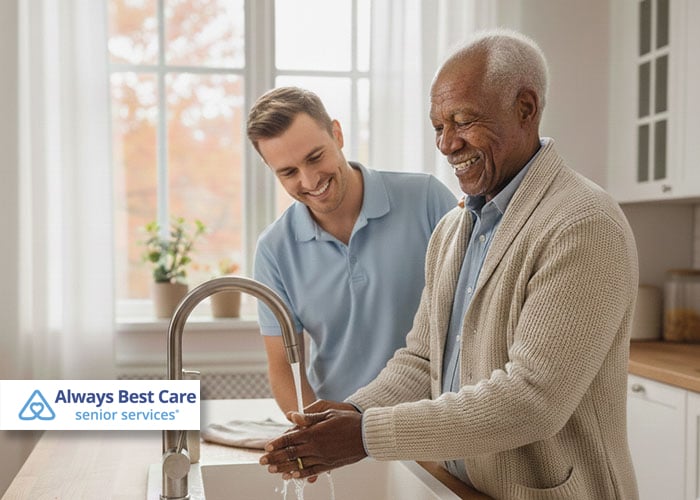Preventing Falls Among Seniors: Always Best Care’s Services in Denver, CO
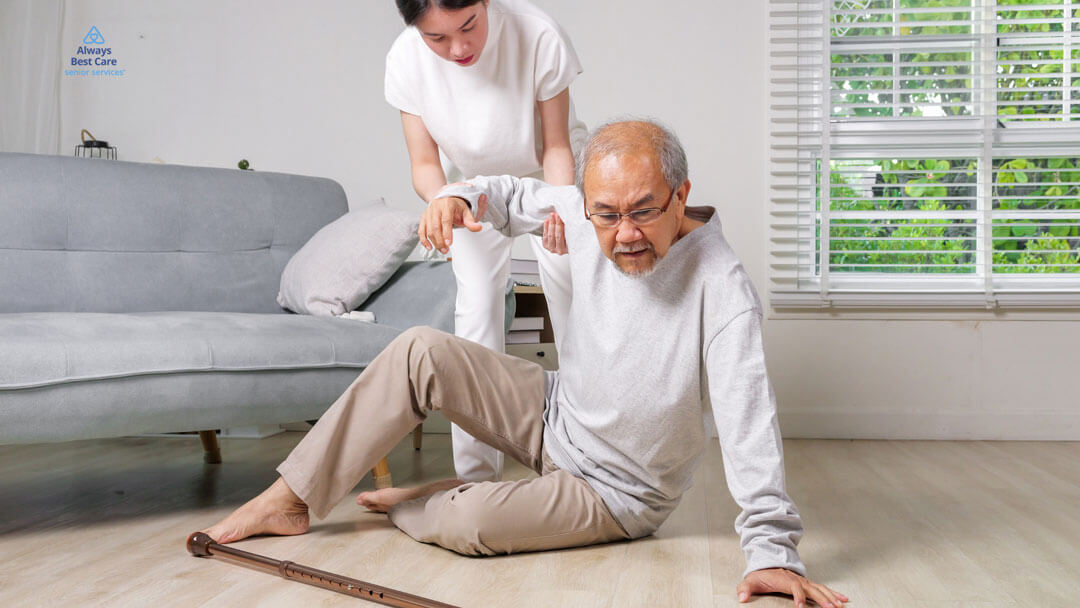
Falls among seniors are a significant concern, as they can lead to severe injuries and decreased quality of life. Always Best Care in Denver, CO, offers comprehensive services and support systems to help prevent falls and maintain the safety and independence of seniors in their homes.
Table of Contents
Why Are Falls Common among Seniors?
The prevalence of falls among seniors is primarily due to aging-related physical and cognitive changes. Diminished muscle strength, balance issues, and slower reflexes increase the risk of falling. Sensory impairments, such as reduced vision and hearing, also contribute to this heightened risk, making it crucial for seniors and their caregivers to adopt proactive measures to mitigate these risks.
Everyday items in a person’s home can become safety hazards as they age. Cluttered pathways, loose rugs, inadequate lighting, and unstable furniture can all pose significant risks. It’s important to regularly assess and modify the living environment to enhance safety and prevent falls.
7 Risk Factors for Falling
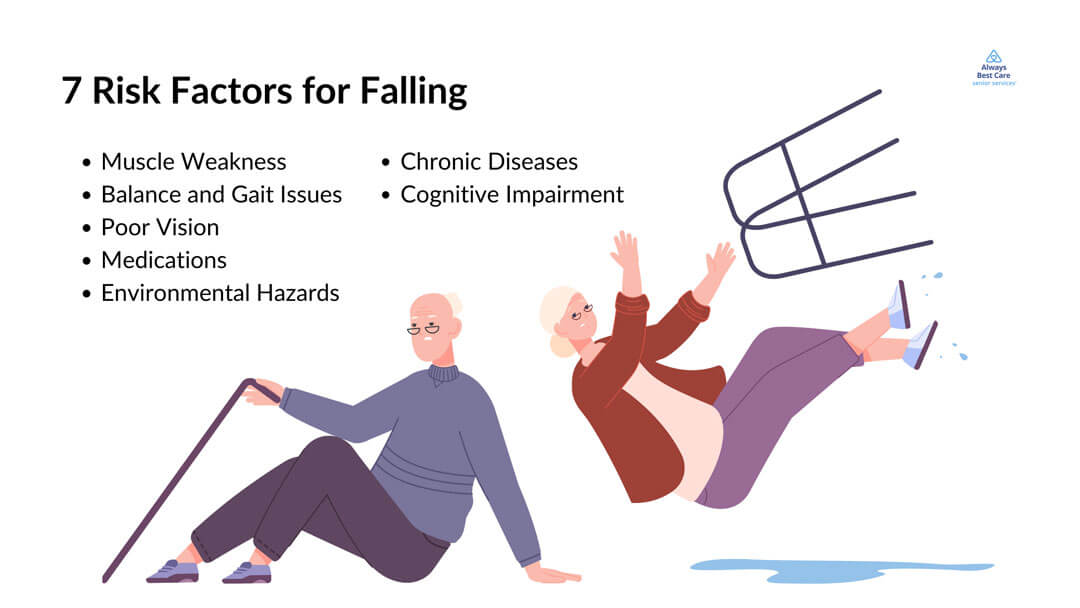
Falls among the elderly are a major concern, posing significant health risks and impacting quality of life. Understanding the underlying factors contributing to these incidents is crucial in developing effective prevention strategies. Here are several risk factors for falling:
- Muscle Weakness: Decreased muscle strength significantly contributes to the risk of falls.
- Balance and Gait Issues: As people age, changes in their gait and a decline in balance can make walking more challenging.
- Poor Vision: Age-related vision diseases can impair depth perception and hazard recognition.
- Medications: Some medications can cause dizziness or dehydration, leading to instability.
- Environmental Hazards: Cluttered floors, slippery rugs, and inadequate lighting are common risks in homes.
- Chronic Diseases: Health conditions like arthritis, diabetes, and heart disease can affect stability.
- Cognitive Impairment: Conditions such as Alzheimer’s disease can disrupt spatial awareness and judgment, increasing fall risk.
What Steps Should Seniors Take after a Fall?
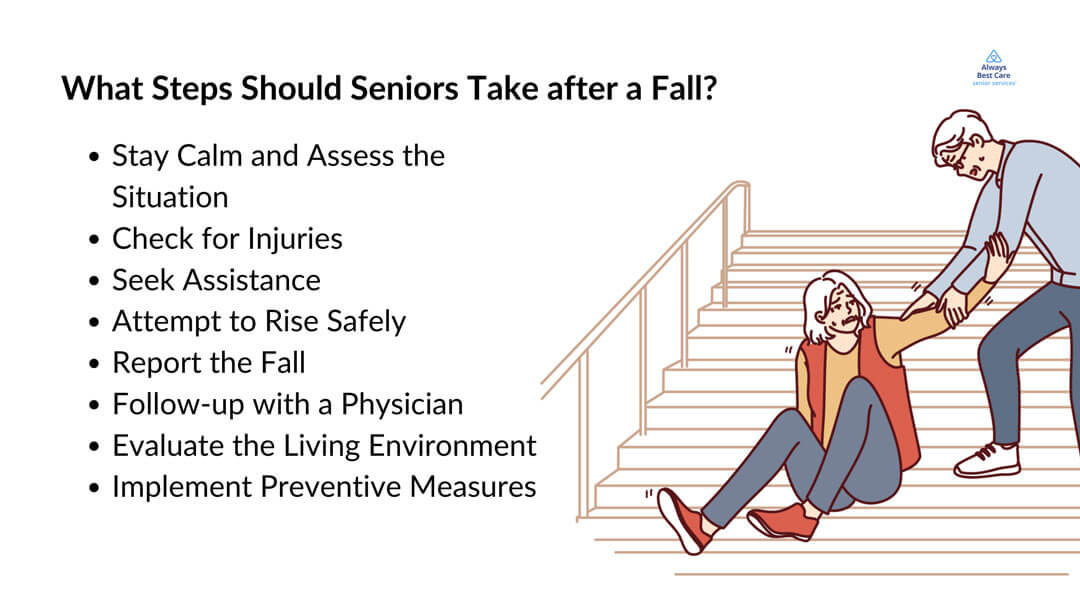
Immediate steps after a fall should include assessing for injuries and contacting healthcare providers if necessary. Reporting the fall to a physician, even if no injuries are apparent, is vital, as it may indicate underlying health issues or the need for adjustments in care or environment.
After a fall, seniors and those around them must take immediate and effective steps to ensure safety and address any potential injuries or underlying health issues. Here’s a detailed plan on what steps should seniors take after a fall:
- Stay Calm and Assess the Situation: The first step after a fall is to remain calm. Seniors should take a few moments to assess whether they can move without pain or if they feel dizzy or disoriented. Panic can exacerbate the situation, leading to further injury.
- Check for Injuries: Before attempting to get up, it’s essential to slowly evaluate the body for any signs of injury, such as pain, bleeding, or bruising. If moving causes pain or is difficult, it’s advisable to stay put and seek help.
- Seek Assistance: If a senior is alone, they should use a personal emergency response system (PERS) if available or a phone to call for help. It’s important not to strain oneself to reach for a phone if it’s not within easy reach; instead, try to use voice commands or wait for someone to check on them if possible.
- Attempt to Rise Safely: If there are no injuries and the senior feels strong enough to get up, they should do so slowly and cautiously. Using nearby sturdy furniture for support, they can maneuver into a kneeling position, place the stronger leg in front, and push up with their arms and legs, moving to a stable seated or standing position.
- Report the Fall: Regardless of whether injuries are evident, it is important to inform a healthcare provider about the fall. This step is critical because a fall could be a symptom of a new or worsening health issue, such as a balance disorder or a medication side effect. Reporting the incident allows for a professional assessment and possibly adjustments in treatment or care plans.
- Follow-up with a Physician: A thorough medical examination is recommended after reporting the fall. This can include checking for potential delayed injuries like concussions or internal bruising, assessing bone health, and reviewing medications.
- Evaluate the Living Environment: After addressing immediate health concerns, it is beneficial to evaluate the environment where the fall occurred. Identifying and modifying risk factors, such as removing loose rugs, improving lighting, and installing grab bars, can prevent future falls.
- Implement Preventive Measures: Based on the circumstances of the fall, seniors may benefit from physical therapy to improve balance and strength, changes in medication, or lifestyle adjustments. Engaging in regular physical activities that enhance muscle strength and balance, such as Tai Chi or gentle yoga, can also be effective in fall prevention.
By following these steps, seniors can not only ensure a safe recovery from a fall but also take proactive measures to prevent future incidents, maintaining their health and independence for as long as possible.
How Always Best Care Makes Your Home Safer
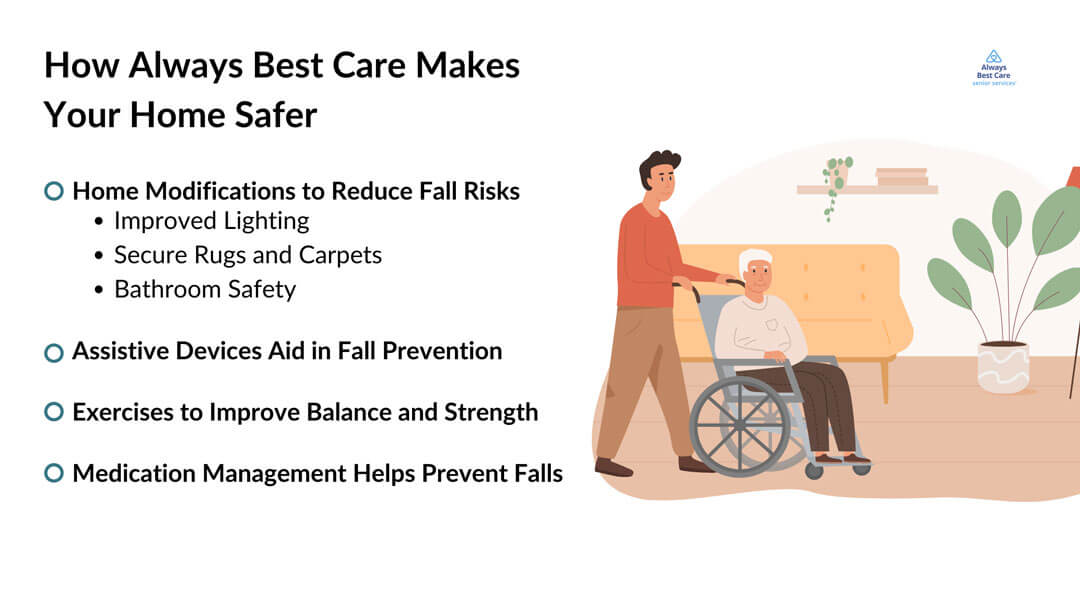
Always Best Care provides personalized assessments to identify specific risks in seniors’ homes and recommends tailored interventions. This might include arranging for professional home safety evaluations and implementing recommendations to ensure environments are as safe as possible.
Home Modifications to Reduce Fall Risks
Key modifications can significantly decrease the likelihood of falls:
- Improved Lighting: Enhancing lighting, especially in hallways and staircases, helps in navigating safely.
- Secure Rugs and Carpets: Ensuring all floor coverings are secure and flat reduces tripping hazards.
- Bathroom Safety: Installing grab bars and non-slip mats in bathrooms is crucial for preventing slips.
Assistive Devices Aid in Fall Prevention
Utilizing assistive devices such as walkers, canes, and wheelchairs can help maintain balance and mobility. Personal emergency response systems are also critical, ensuring seniors can call for help immediately after a fall.
Exercises to Improve Balance and Strength
Regular physical activity is essential for maintaining muscle strength and balance. Exercises such as Tai Chi, yoga, and even simple stretching can significantly improve a senior’s stability and reduce the risk of falls.
Medication Management Helps Prevent Falls
Proper medication management, facilitated by Always Best Care, ensures that the medications do not contribute to fall risks. This includes reviewing and adjusting prescriptions as necessary and educating seniors and caregivers about potential side effects.
Preventing falls among seniors involves addressing physical risks and comprehensive planning and support. Always Best Care in Denver is dedicated to providing the resources, care, and guidance necessary to enhance seniors’ home safety and well-being.
Take the First Step in Fall Prevention: Reach Out to Always Best Care in Denver!
Always Best Care ensures a holistic approach to senior safety by addressing the multifaceted aspects of fall prevention and all other areas of in-home care.
Contact Always Best Care of Denver at (720) 310-6998 to learn more and schedule your free consultation.




